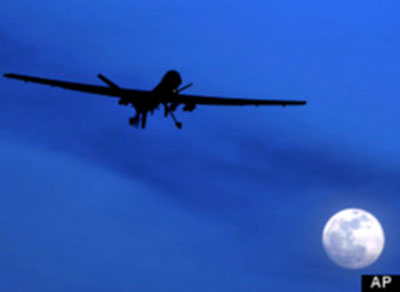
June 13, 2012
from
HuffingtonPost Website

The U.S. Military is looking to relocate some of their predator drones,
sending some to South and Central America, according to
a new article in
Wired Magazine.
As US forces come home from Afghanistan, the US military seems to have a
surplus of predator drones - remotely operated unmanned aircraft vehicles
often used to carry out attacks and intelligence gathering missions.
Drones previously used in Afghanistan will be
given to "operational missions by previously undeserved" commands, including
those in the Pacific and in Southern America,
according to Chief of Staff of
the Air Force, General Norton Schwartz. While the exact number of drones,
which will be sent to Latin America remains unknown, the implications of
their presence remain hotly contested.
Some question whether their presence in the region is even necessary or
whether they will be effective in thwarting drug traffickers.
Micah Zenko of the
Council on Foreign
Relations told Wired Magazine that while the drones could help with spy
missions in South America, there is no good reason to use their attack
capabilities.
“There is no strategic rationale for the
United States to be responding to the flow of drugs from Latin America
with the tactical use of kinetic force against drug planes or boats you
happen to be able to find, ” he said.
Furthermore, Zenko noted that the drones might
be better used for United Nations peacekeeping operations in regions like
Southern Sudan.
“3,800 troops deployed right now for an
[area] of 2,100 kilometers, with poor roads that wash out in the rainy
season,” Zenko told Wired Magazine. “The deployment of these [spy]
capabilities, and associated logistics and training infrastructure,
would make a huge difference.”
Just days after the announcement that drone
presence will be increased in Latin America, the Pew Research Center
released a study suggesting that the Obama administration’s use of unmanned
drone strikes to kill terror suspects is widely opposed around the world.
On Wednesday, Pew reported that in 17 out of 21
countries surveyed,
"more than half of the people disapproved of
U.S. drone attacks targeting extremist leaders and groups in nations
such as Pakistan, Yemen and Somalia,"
according to The Associated Press.
But a majority of Americans, 62 percent, approve
the increased drone strikes.
Despite international disapproval of the tactic, the Obama administration
insists that the drone campaigns have been effective and have saved American
lives.
Drone strikes have killed numerous "high-value
leaders",
"arguably more than any other method
including more than a decade of special operations raids inside
Afghanistan," according to The Associated Press.
Earlier this month, a drone strike killed
al-Qaeda's second in command, Abu Yahya al-Libi.
"In order to prevent terrorist attacks on
the United States and to save American lives, the United States
government conducts targeted strikes against specific al-Qaida
terrorists, sometimes using remotely piloted aircrafts, often referred
to publicly as drones,” White House counterterrorism chief John Brennan
said earlier this year, according to The Associated Press.
Predator drones are not just being used abroad,
however.
The U.S. Customs and Border Protection agency
have increased the use of the aircraft to patrol the Southern borderlands
and interior for drug raids.
Last month, the agency announced that two new
unmanned drones would fly in Washington states' airspace.
The drones deployed in Washington will be
10,000-pound Predator-B unmanned aircraft with 950-mile coverage ranges that
can stay in the air for up to 20 hours at a time, border patrol spokesperson
Gina Gray
told The Associated Press.
The announcement came as part of the Department
of Homeland Security's six year effort to build the nation's,
"largest fleet of domestic surveillance
drones."
Critics of the use of unmanned aircraft on U.S.
soil (and airspace) say Predator drones are not as effective as less pricey
aircraft in drug-smuggling cases, and could be an invasion of privacy for
American citizens.
"The border drones require an hour of
maintenance for every hour they fly," they cost about $3,000 an hour to
operate, and the amount of drugs seized in raids initiated by
drone-supplied information was described as "not impressive" by the man
who supervises the initiative, according
the LA Times.
The ACLU called drones,
"a large step closer to a surveillance
society in which our every move is monitored, tracked, recorded, and
scrutinized by the authorities.”
Some believe the use of predator drones in Latin
America is not really about making narcotic raids more successful, but more
about opening this region of the world to the use of the new technology.
Peter Singer of the Brookings Institution
told Wired Magazine that he suspects the U.S. military wants to use the
technology in Latin America to,
"make sure the system doesn’t get
pigeonholed as being just for Afghanistan or Iraq.”
“You want to build up familiarity with the systems and its uses, and
even foibles, in other commands, so that when you use it more
operationally in the future you have a base to build on.”
Singer added,
“And finally, as you introduce a system into
a new area and to new people, they will innovate and find new uses for
it.”

